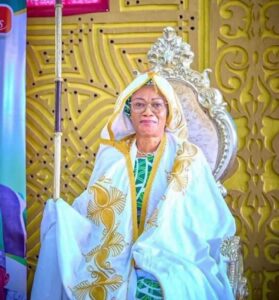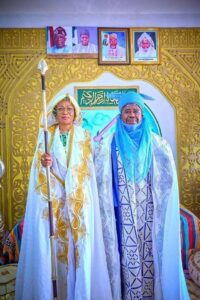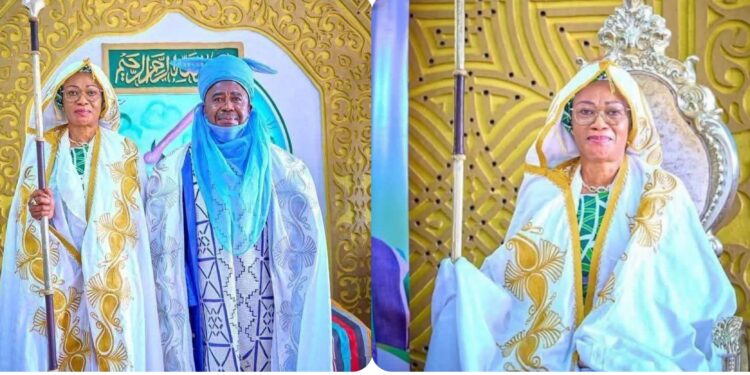By Ibrahim Kegbegbe
Gombe, Nigeria — October 2, 2025
The wife of Nigeria’s President, Senator Oluremi Tinubu, was on Thursday conferred with one of the most symbolic titles in Northern Nigeria—Sarauniyar Yaki of Akko Emirate (Princess of War/Brave Woman of Akko).
The title, steeped in history and tradition, was bestowed during a colorful ceremony at the palace of the Emir of Akko in Gombe State, attended by dignitaries, traditional rulers, and cultural enthusiasts from across the country.
A Title Rooted in History
In Hausa tradition, the title Sarauniyar Yaki is reserved for women who embody courage, resilience, and service to society. By conferring it on Nigeria’s First Lady, the Akko Emirate highlighted her role in championing women’s rights, social development, and national unity.

The Emir of Akko, in his remarks, described the recognition as both symbolic and historic:
“Her Excellency represents courage and compassion in leadership. This title is not just ceremonial; it reflects the strength and responsibility our culture places on women who influence society positively. Senator Tinubu has shown these qualities, and we are proud to welcome her as our Sarauniyar Yaki.”
Oluremi Tinubu’s Response
Visibly moved, Senator Tinubu expressed her gratitude to the Emirate, promising to continue advancing causes dear to women and children across Nigeria.
“This title is a call to service, a reminder that bravery is not just on the battlefield but in standing firm for justice, compassion, and unity. I accept it with humility, and I dedicate it to all Nigerian women who are the backbone of our families and communities,” she said.

Akko Emirate and Its Significance
The Akko Emirate, one of the oldest traditional institutions in Gombe State, is known for its role in preserving Hausa-Fulani culture and history. Once a center of warrior traditions in the North-East, it has evolved into a symbol of cultural resilience and unity.
Historians say the Sarauniyar Yaki title is rarely conferred, and when it is, it carries immense weight. Dr. Suleiman Garba, a historian at Gombe State University, explained:
“The conferment of this title on Senator Oluremi Tinubu is significant. It bridges modern political leadership with indigenous institutions. It also shows how traditional rulers are aligning with national leaders to strengthen unity in diversity.”
Cultural Diplomacy and National Unity
Analysts believe the recognition extends beyond symbolism. It highlights the Tinubu administration’s relationship with Northern Nigeria’s traditional rulers and underscores the importance of cultural diplomacy in fostering unity.
According to political commentator Zainab Abdullahi:
“This is not just about Oluremi Tinubu; it is about Nigeria. Traditional institutions remain influential, and by embracing them, the presidency shows it values grassroots connection. In a diverse country like ours, such gestures build bridges.”
A Continuation of Service
Oluremi Tinubu, a former senator representing Lagos Central and now Nigeria’s First Lady, has long been a champion of women’s empowerment and youth development. Her Renewed Hope Initiative has launched multiple programs addressing education, healthcare, and economic empowerment for vulnerable groups.
READ ALSO:Tinubu Declares: The Worst Is Over for Nigeria
The Sarauniyar Yaki honor is seen as a recognition of these efforts, placing her in a lineage of women leaders celebrated for their courage and service.
The Merit Newspaper reports that the conferment of the Brave Woman of Akko title on Oluremi Tinubu reflects more than tradition—it symbolizes a bond between culture and governance, a bridge between past and present. For the women of Nigeria, it also serves as a reminder that courage is not confined to history but is alive in contemporary leadership.
READ ALSO:Nigeria at 65: Ajadi Demands Peace, Accountability, Progress
As the celebrations in Gombe came to a close, one thing was certain: Senator Oluremi Tinubu’s new title has cemented her place not only in the palace walls of Akko Emirate but also in the cultural and political history of Nigeria.

















